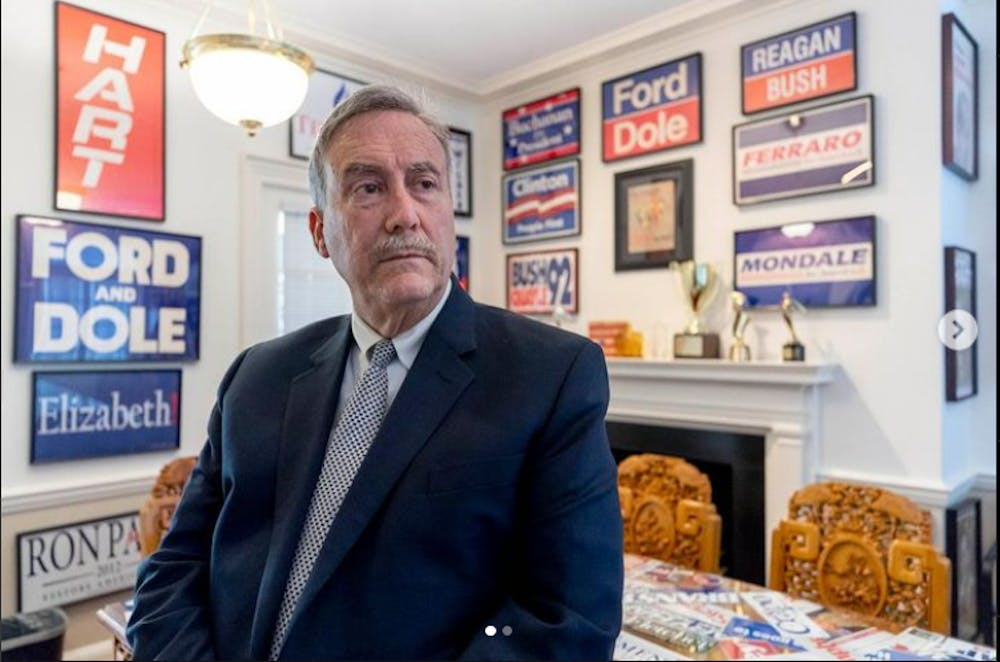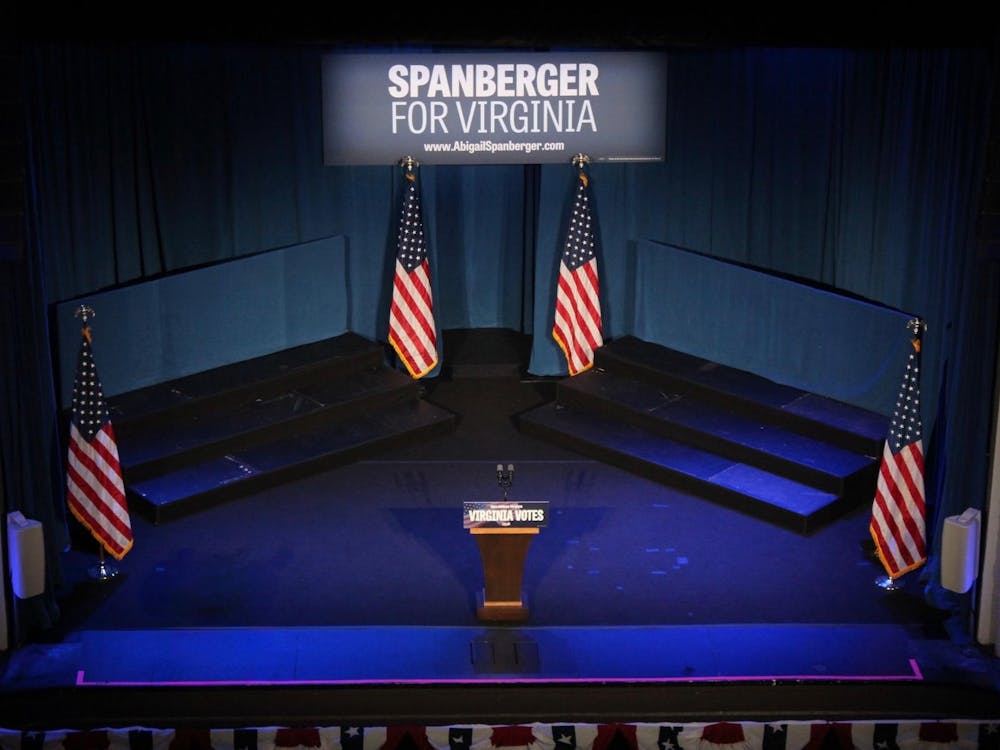As the matchup for the 2024 Presidential Election crystallizes — with Democratic President Joe Biden facing former Republican President Donald Trump — the University Center for Politics is gearing up for a rare rematch between two divisive candidates. With young voters voicing early pessimism about the choices, the Center’s director, Larry J. Sabato, prepares for an election he calls “unprecedented.”
Sabato is an active member of the University community, living on the Lawn in a pavilion and teaching classes at the Frank Batten School of Leadership and Public Policy. However, during an election year, his responsibilities ramp up. In addition to events at the Center, Sabato’s Crystal Ball develops detailed, nonpartisan forecasts to predict the outcome of the November elections — often with accurate results.
In both the 2008 and 2012 presidential elections, Sabato’s Crystal Ball newsletter correctly predicted the outcome in 48 of 50 states. In 2016, when forecasters — including Sabato — by-and-large incorrectly predicted a Hillary Clinton victory, the forecast still got 45 states correct. By 2020, the forecast’s accuracy bounced back, as Sabato correctly predicted 49 of 50 states and the overall outcome of a Biden win.
To make these predictions and fully dive into the Crystal Ball, Sabato does not teach during presidential election years. Instead, alongside editors Kyle Kondik and J. Miles Coleman, he constructs the newsletter which forecasts the race for president, U.S. Congress and individual governorships across the country.
Informed by his experience predicting and analyzing past elections, Sabato noted that this presidential election has a number of firsts. Biden will be the first major candidate for president over the age of 80 and Trump would be the first with over 90 criminal indictments. In reference to Trump’s legal troubles, Sabato said this election is “unprecedented.”
“I didn't think anything could surprise me after seven decades or more in politics, but this surprises and appalls me,” Sabato said. “We've never faced this before. The voters are going to be given this choice and one of the two candidates could easily be sentenced to prison.”
Given these complications, Sabato said that 2024 will be a tough election to forecast.
“Nobody knows when they’re going to be held, or when a verdict could be reached or how long the appeals are going to take,” Sabato said. “How do you predict an election when you don't even know if the trials will be finished?”
These unusual circumstances may be driving down voter enthusiasm. On March 5, just over 350,000 votes were cast in the Virginia Democratic presidential primary. That figure is down substantially from the over 1.3 million votes cast in the 2020 Virginia Democratic presidential primary. And while low primary turnout does not always correlate with low turnout in the general election, a recent Axios-Generation Lab poll showed that more than half of voters aged 18-34 are unsure if they will vote in November.
A lack of enthusiasm may prove decisive in a close election. Today, polls show a tight race between Biden and Trump, with Trump ahead in many state-by-state and national polls. One recent Morning Consult poll in Michigan showed Trump up six points with voters aged 18-34. Biden won voters under 30 by 24 points in 2020. If current trends continue, the shift in younger voters favoring Trump over Biden would be one of the most dramatic political realignments the country has seen in decades.
However, Sabato said it’s still too early to use current estimates from the polls to come to any decisions about the final election result, as preferences can, and likely will, shift in the months leading up to the election.
“It’s February,” Sabato said. “Please don’t forget that.”
However, Sabato has provided some forecasting for how voters feeling unenthused by either candidate might act in November. As campaigning begins and more primaries are concluded, polling and research provide vague projections of the forthcoming election.
One possibility is that apathetic voters will stay home, creating relatively low turnout, according to Sabato.
“A lot of people look for an excuse not to vote,” Sabato said. “It doesn't take much to keep some people home, and they can cite [dissatisfaction with the candidates] as what they consider to be a legitimate excuse.”
Sabato cited his own personal voting experiences to show the importance of voting even when faced with barriers. He recalled speeding down Interstate 64 to Norfolk when he was a student at the University so he could vote in the 1972 Presidential Election, as Virginia did not offer absentee voting at that time.
“The people who ran Virginia did not want young people voting. So they made it as difficult as possible,” Sabato said. “Which made me more determined than ever not to be late.”
Once they reach the polls, Sabato noted that instead of casting a ballot for Trump or Biden, voters have the option to vote for third party candidates. In 2016, third party candidates — including Green Party members and Libertarians — took a combined 6.1 percent of the popular vote — the highest share since 2000. Sabato points out, however, that third party candidates typically wane in their popularity as the election approaches.
“You get closer and closer to election day, and people get more and more serious about their voting,” Sabato said.
An outspoken Trump critic himself, Sabato said he questions if voters want to be held liable for electing Trump again if they vote third party.
“Would you want to be the next Jill Stein? Would you want to be the person that history blames for the second term of Donald Trump, which is bound to be far worse than the first?” Sabato said.
Stein, a member of the left-wing Green Party, took a notable percentage of votes in battleground states in 2016, which many commentators say helped lift Trump to victory. This time around, a number of third-party candidates are running, including Stein again and Robert F. Kennedy Jr., who appeared at the School of Law in January in a controversial closed media event.
At the end of the day, Sabato concludes that many voters will likely stick with their political party despite currently registering disapproval. According to 2020 exit polls, 94 percent of Democrats and Republicans voted for Biden and Trump, respectively. Instead the election was won at the margins, as Biden won independents by 13 points.
With variables like the age of the candidates, Trump’s legal battles, the close poll numbers and the list of third-party candidates, Sabato says it is too early to start his official predictions on who will take the 2024 election.
“We’re looking at it day-by-day,” Sabato said. “You don’t know [who will win], you couldn’t possibly know. We don’t even know if they’ll both be standing above ground by November.”
Until then, Sabato will remain in his dark corner, peering over his crystal ball and hoping to get all 50 states right.







